Week 06 - Lab Day - Communication Skills - Conveying Empathy & Authenticity Verbal Following, Exploring, & Focusing Skills
A presentation at Heritage University at CBC Week 06 in in Pasco, WA 99301, USA by Jacob Campbell

SOWK 486 Fall 2019 Planning: Class 06
Location: CBC Campus - SWL 206
Time: Wednesday from 5:30-8:15
Week 06: 09/23/19 — 09/29/19
Reading Assignment: N/A
Topic and Content Area: Lab Day - Communication Skills
Assignments Due: N/A
Other Important Information: N/A

Agenda
- What’s you’ve learned so far
- Teaching following skills
- Practice with following skills
- Empathetic communication scale
- Practice with labeling empathetic levels
- Teaching empathy

What We Have Been Learning: Checking In
Clifford, A. (n.d.) Teaching restorative practices with classroom circles. Retrieved from https://www.healthiersf.org/RestorativePractices/Resources/documents/RP%20Curriculum%20and%20Scripts%20and%20PowePoints/Classroom%20Curriculum/Teaching%20Restorative%20Practices%20in%20the%20Classroom%207%20lesson%20Curriculum.pdf#page20
Group Norms:
- Respect the talking piece: everyone listens, everyone has a turn
- Speak from the heart: your truth, your perspectives, your expriences
- Listen from the heart: Let go of stories that make it hard to hear each other
- Trust that you know what to say: no need to rehearse
- Say just enough: without feeling rushed, be concise and considerate of the time of others
- What are some things that you feel like you can take away from this class so far?
- What are ways that you are implementing or incorporating things you have been learning in any of your classes into your life?
- What do you need to be a better social worker as you progress through your education?

Teaching Empathy
We often times think about empathy as being able to put ourselves into someone else’s shoes, but we must also think how we can teach our clients to put themselves into somebody shoes.
An important task for the social worker involves teaching clients to respond emphatically. With respect to this role, social workers should consider taking the following actions:
- Teach clients the paradigm for empathic responding.
- Introduce clients to the list of affective words and phrases and to the Leads for Empathic Responses list.
- Intervene in sessions when clients ignore or fail to validate messages.
- Give positive feedback when clients listen to each other.

What Would You Teach?
[Small Group Activity] Work in teams of 3 or 4 to design a planned intervention for teaching empathy.

Discrete Verbal Following Skills
“Verbal following involves the use and sometimes blending of discrete skills that enable social workers to maintain psychological contact with clients on a moment-by-moment basis and to convey accurate understanding of their messages. Moreover, verbal following behavior takes into account two performance variables that are essential to satisfaction and continuance on the part of the client:”
- Stimulus-response congruence: The extent to which social workers’ responses provide feedback to clients that their messages are accurately received.
- Content relevance: The extent to which the content of social workers’ responses is perceived by clients as relevant to their substantive concerns.

Furthering responses
- Minimal prompts signal the social worker’s attentiveness and encourage the client to continue verbalizing.
- Nonverbal minimal prompts consist of nodding the head, using facial expressions, or employing gestures that convey receptivity, interest, and commitment to understanding. They implicitly convey the message, “I am with you; please continue.”
- Verbal minimal prompts consist of brief messages that convey interest and encourage or request expanded verbalizations along the lines of the client’s previous expressions.
- Accent responses (Hackney & Cormier, 2005) involve repeating, in a questioning tone of voice or with emphasis, a word or a short phrase. Suppose a client says, “I’ve really had it with the way my supervisor at work is treating me.” The social worker might reply, “Had it?”

There are two basic types of of reflection:
There are two basic types of of reflection:
- Reflection of Content: emphasize the cognitive aspects of client messages, such as situations, ideas, objects, or persons (Hackney & Cormier, 2005).
- Reflection of Affect: focus attention on the affective part of the communication (Cormier, Nurius, & Osborn, 2009). In reflections of affect, social workers relate with responses that accurately capture clients’ affect and help them reflect on and sort through their feelings
Reflection can take the form of the following forms:
- Simple reflections, which identify the emotions expressed by the client, are a heritage from nondirective, client-centered counseling
- Complex reflections go beyond what the client has directly stated or implied, adding substantial meaning or emphasis to convey a more complex picture
- Reframing: is another form of adding content. Here, the social worker puts the client’s response in a different light beyond what the client had considered (Moyers et al., 2003)
- Double-sided reflection: Sometimes clients express indecision and conflict between several alternatives. that captures both sides of the dilemma that is fostering ambivalence about acting (Miller & Rollnick, 2002)
- Reflections with a twist are reflections in which the social worker agrees in essence with the dilemma expressed by the client but changes the emphasis, perhaps to indicate that the dilemma is not unsolvable but rather that the client has not at this time solved it (Miller & Rollnick, 2013)

Closed-ended responses
Closed-ended questions define a topic and restrict the client’s response to a few words or a simple yes or no answer.

Open-ended responses
Open-ended questions and statements invite expanded expression and leave the client free to express what seems most relevant and important.

Seeking concreteness (1 of 2)
Seeking concreteness is an important aspect of drawing out information from a client. We can use it to obtain concreteness in a number of areas:
- Checking out Perceptions: Understanding how they view the world
- Clarifying the Meaning of Vague or Unfamiliar Terms: Clients often times use vague terms. What does this actually mean?
- Exploring the Basis of Conclusions Drawn by Clients: Why do they think things are this way
- Assisting Clients in Personalizing Their Statements: Helping understand what it means for them…
- Focus on self
- Focus on others
- Focus on group or relationships
- Focus on content

Seeking concreteness (2 of 2)
- Eliciting Specific Feelings: How do they feel more specifically.
- Focusing on the Here and Now: moving out of the past.
- Eliciting Details Related to Clients’ Experiences: What they’ve done
- Eliciting Details Related to Interactional Behavior: How their interactions has been

Providing and maintaining focus
The functions of focusing skills include
- Selecting topics for exploration
- Exploring topics in depth
- Managing obstacles to focusing

Summarizing
Four Distinct facets of summarizing:
- Highlighting key aspects of discussions of specific problems, strengths, and resources before changing the focus of the discussion
- Making connections between relevant aspects of lengthy client messages
- Reviewing major focal points of a session and tasks that clients plan to work on before the next session
- Recapitulating the highlights of a previous session and reviewing clients’ progress on tasks during the week for the purpose of providing focus and continuity between sessions


Following Skills: Demonstrating Skills
We also need to be able to demonstrate and use direct implementation of skills to be able to more effective.
- In groups of three you will each have a specific roll. There will be an interviewer, an interviewee, and an observer
- The interviewer will pick two or three of the interviewing techniques that they want to practice using. Discuss this with your group prior to starting.
- Interview the respondent regarding something that is a passion [hobby, interest, story… etc] of theirs
- Debrief after and switch rolls after about 10 minutes

Following Skills: Demonstrating Skills
We also need to be able to demonstrate and use direct implementation of skills to be able to more effective.
- In groups of three you will each have a specific roll. There will be an interviewer, an interviewee, and an observer
- The interviewer will pick two or three of the interviewing techniques that they want to practice using. Discuss this with your group prior to starting.
- Interview the respondent regarding something that is a passion [hobby, interest, story… etc] of theirs
- Debrief after and switch rolls after about 10 minutes

Following Skills: Demonstrating Skills
We also need to be able to demonstrate and use direct implementation of skills to be able to more effective.
- In groups of three you will each have a specific roll. There will be an interviewer, an interviewee, and an observer
- The interviewer will pick two or three of the interviewing techniques that they want to practice using. Discuss this with your group prior to starting.
- Interview the respondent regarding something that is a passion [hobby, interest, story… etc] of theirs
- Debrief after and switch rolls after about 10 minutes

The Empathic Communication Scale (1 of 8)
Empathic responding is a fundamental yet complex skill that requires systematic practice and extensive effort to achieve competency.
- Some social workers dismiss the need for training in empathic responding, mistakenly believing themselves to already be empathic in their contacts with clients.
We can all improve our own level of empathetic responding. I would encourage you to consider where you really are at in regarding to your ability to empathetically respond.
There are six levels on the empathic communication scale:
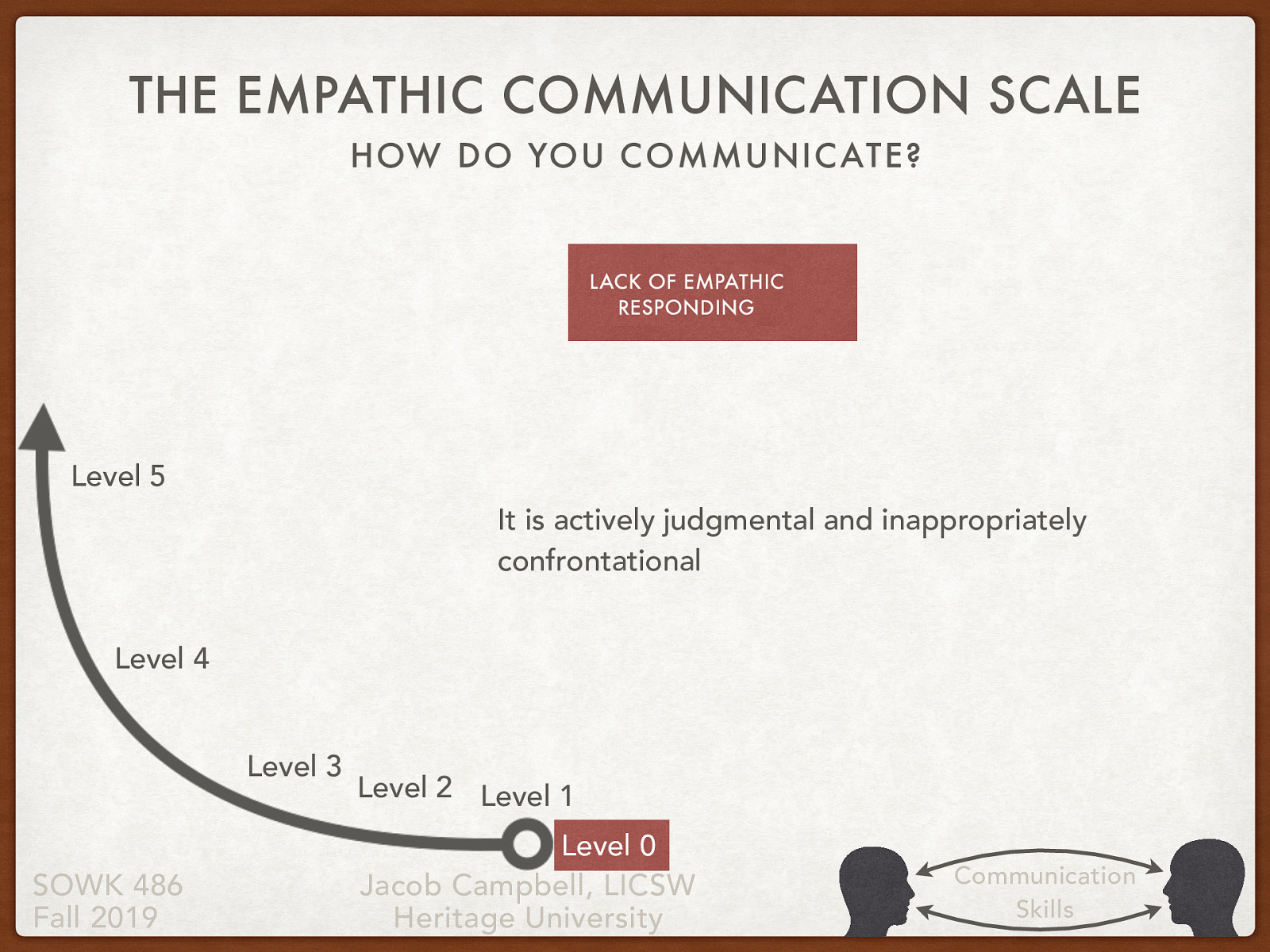
The Empathic Communication Scale (2 of 8)
Level 0: Lack of empathic responding
It is actively judgmental and inappropriately confrontational
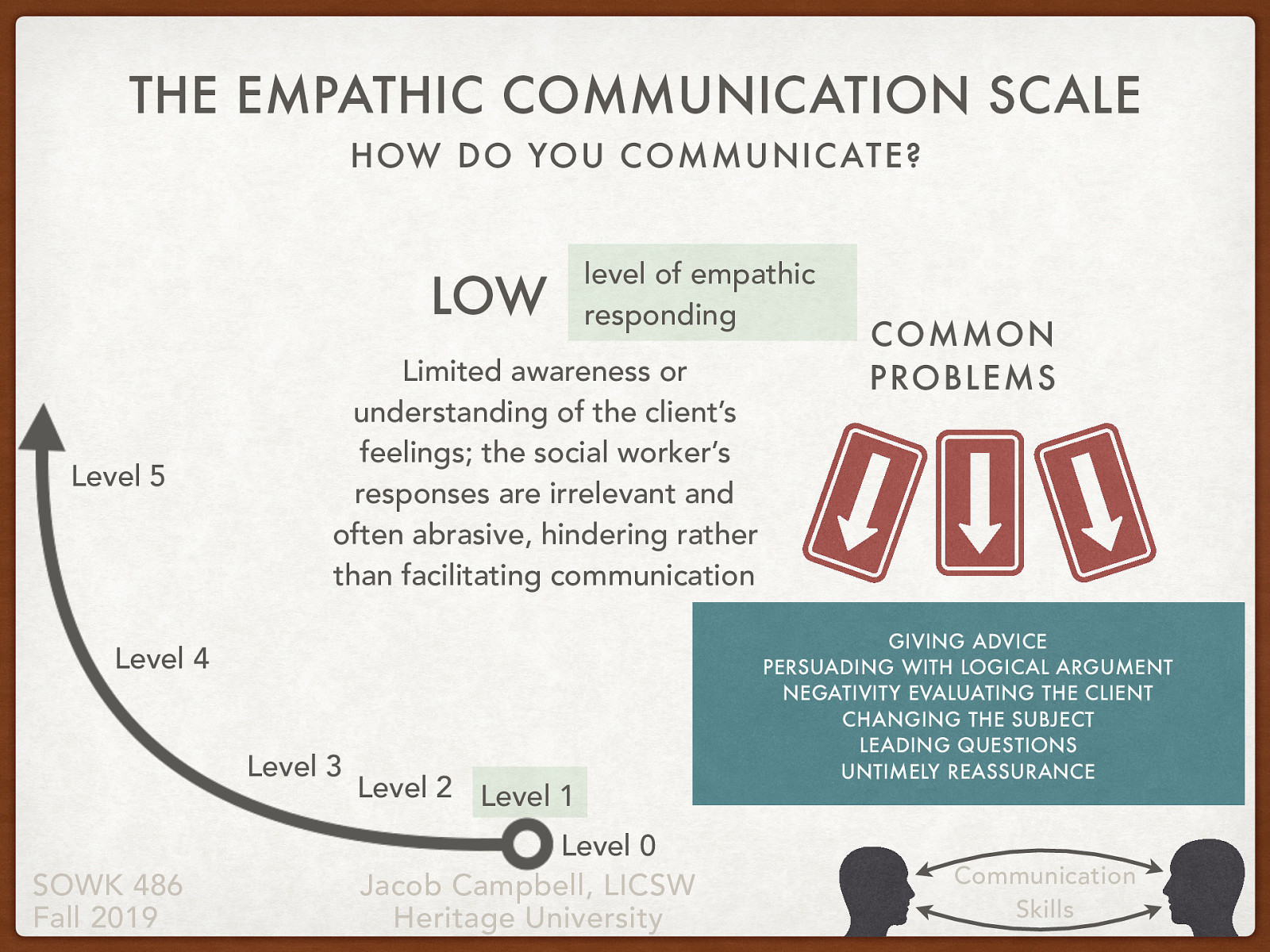
The Empathic Communication Scale (3 of 8)
Level 1: Low level of empathic responding
Limited awareness or understanding of the client’s feelings; the social worker’s responses are irrelevant and often abrasive, hindering rather than facilitating communication
Common problems related to level one are…
- Giving advice
- Persuading with logical argument
- Negativity evaluating the client
- Changing the subject
- Leading questions
- Untimely reassurance

The Empathic Communication Scale (4 of 8)
Level 2: Moderately low level of empathic responding
Responding to client’s surface message but omitting feelings or factual aspects
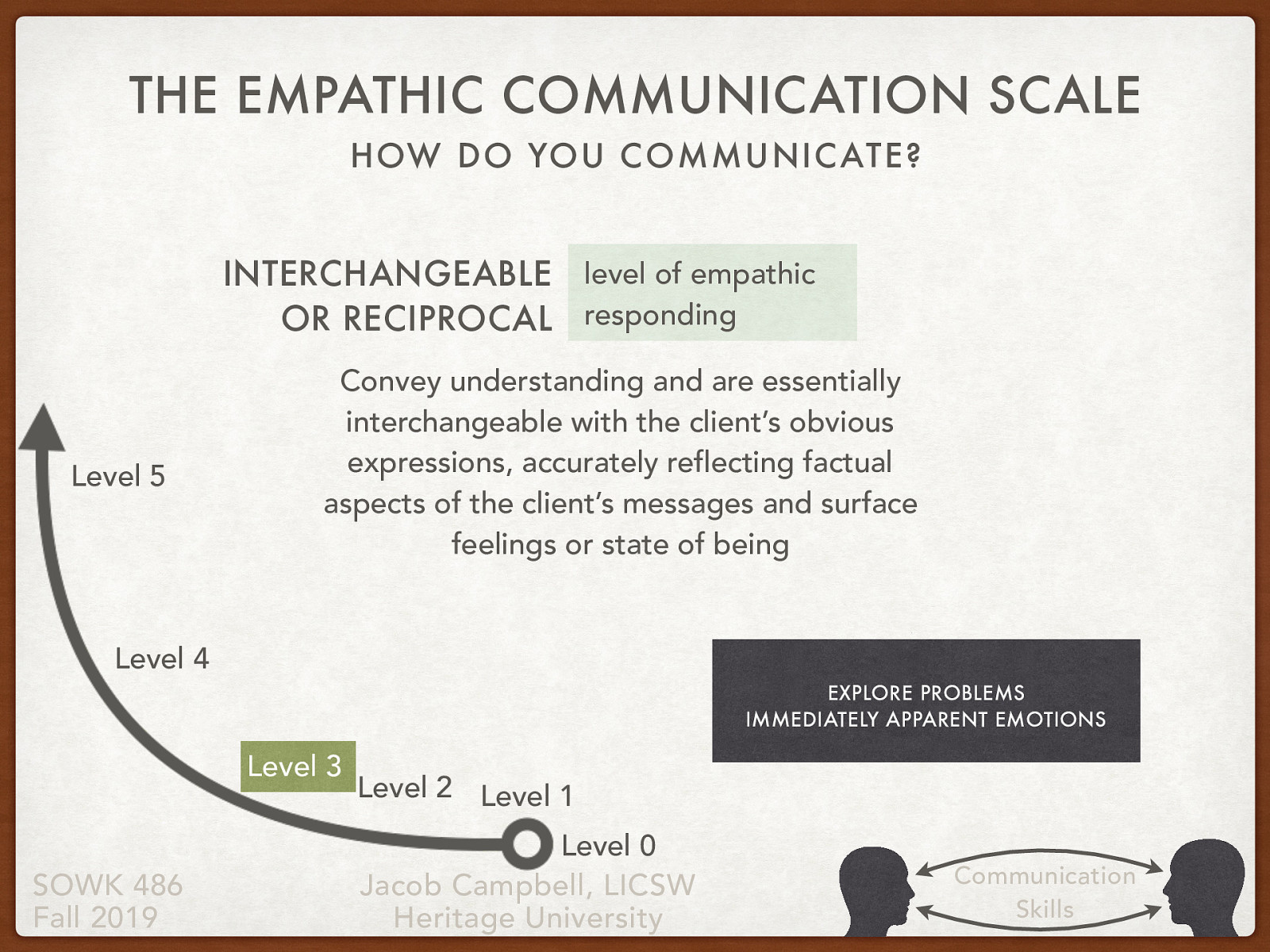
The Empathic Communication Scale (5 of 8)
Level 3: Interchangeable or reciprocal level of empathic responding
Ok therapeutic level of empathetic communication…
convey understanding and are essentially interchangeable with the client’s obvious expressions, accurately reflecting factual aspects of the client’s messages and surface feelings or state of being
- Explore problems: Can be used for further exploration of problem focused responses of the client
- Immediately apparent emotions: responses such as these express accurately the immediately apparent emotions in the client’s message
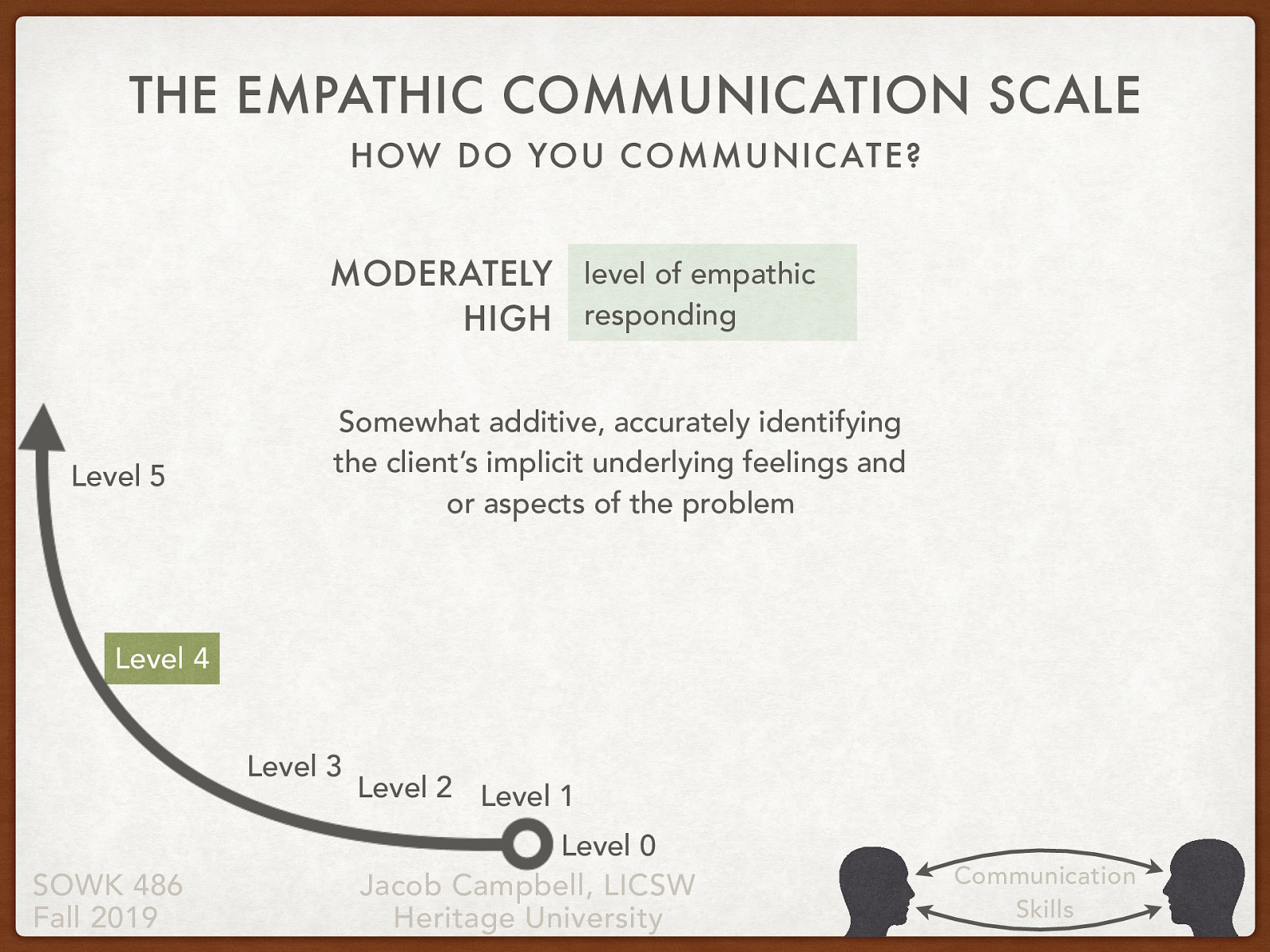
The Empathic Communication Scale (6 of 8)
Level 4: Moderately high level of empathic responding
Somewhat additive, accurately identifying the client’s implicit underlying feelings and/or aspects of the problem
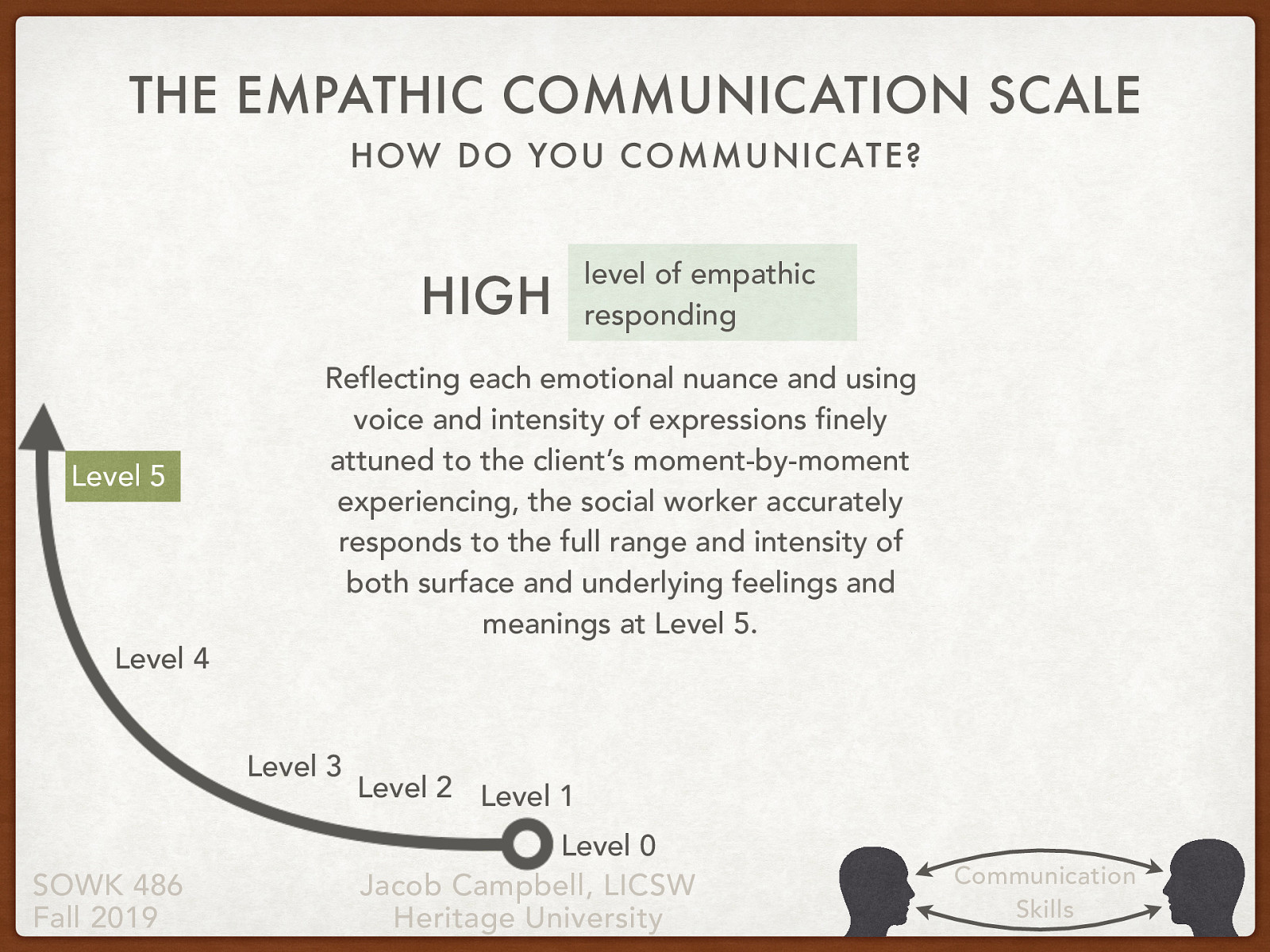
The Empathic Communication Scale (7 of 8)
Level 5: High level of empathic responding
Reflecting each emotional nuance and using voice and intensity of expressions finely attuned to the client’s moment-by-moment experiencing, the social worker accurately responds to the full range and intensity of both surface and underlying feelings and meanings at Level 5.
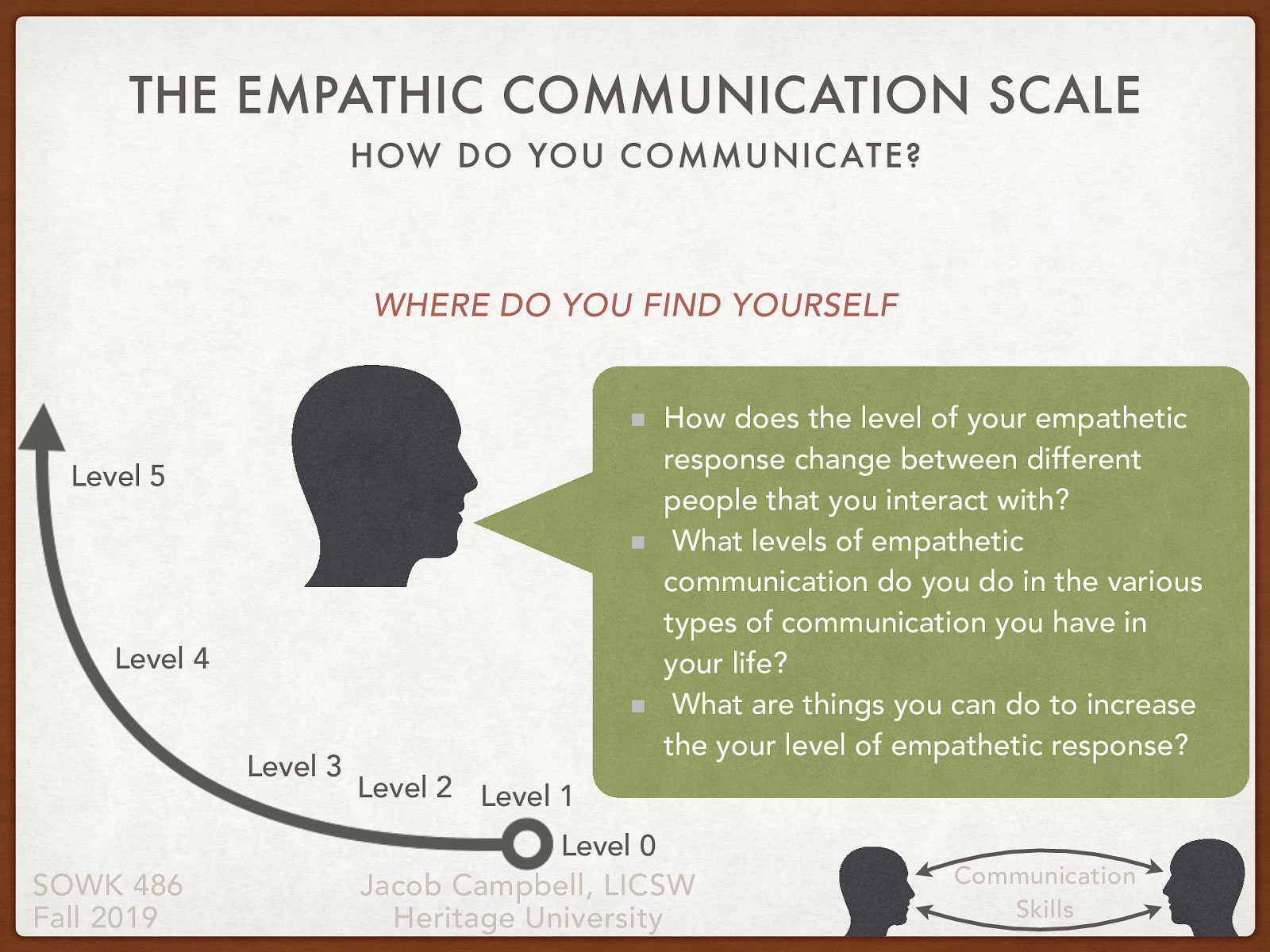
The Empathic Communication Scale (8 of 8)
While we do not need to be in all of our relationships, or in every arena. I believe it can be helpful for us to self evaluate ourselves and what levels we might be at.
[Small Group Activity] Partner discussion with the following points:
- How does the level of your empathetic response change between different people that you interact with?
- What levels of empathetic communication do in the various types of communication you have in your life?
- What are things you can do to increase the your level of empathetic response?
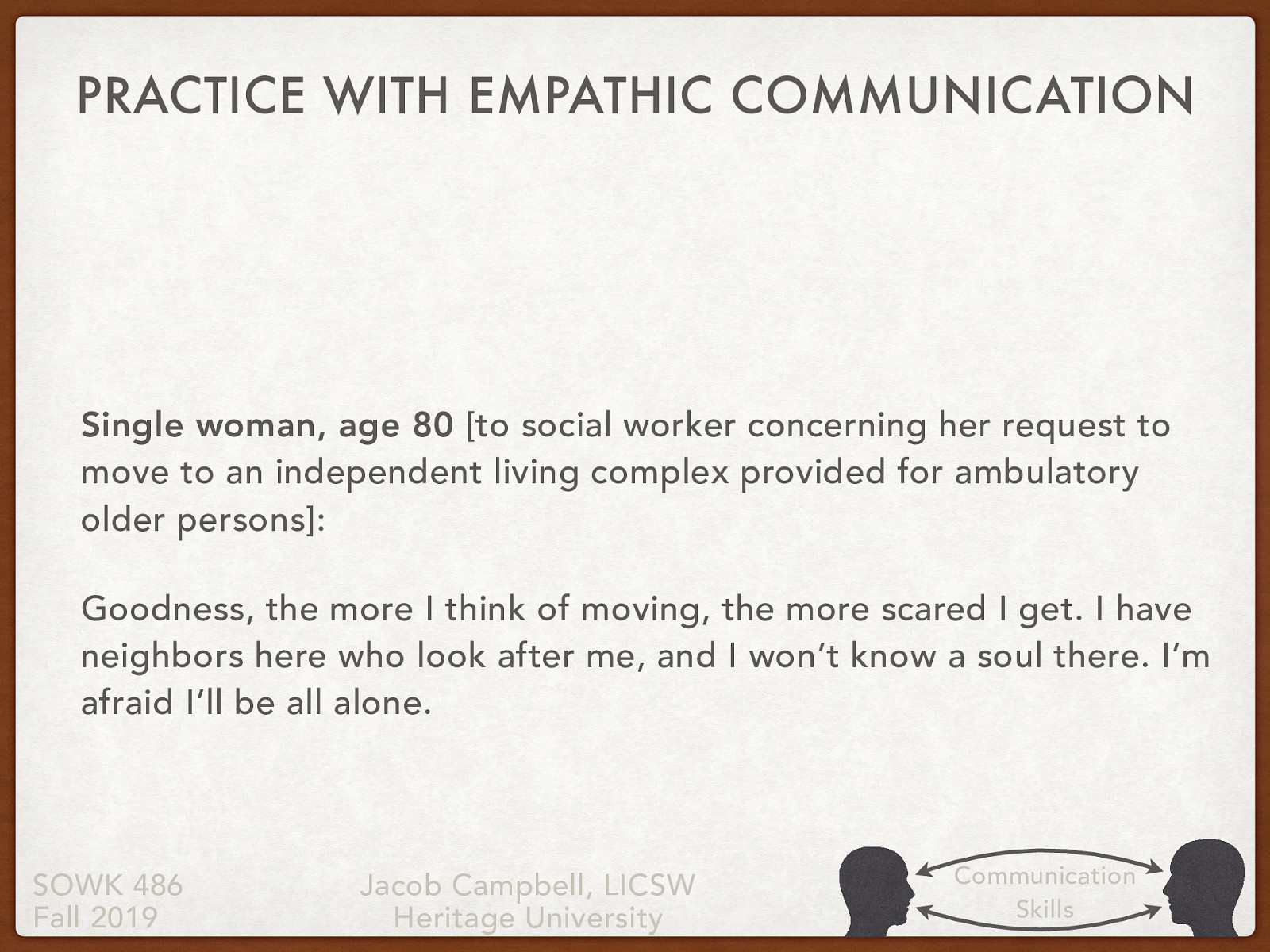
Practice with Empathic Communication (1 of 2)
[Individual Activity] Read the statement below regarding the 80 year old woman. Come up with some possible empathetic responses that a social worker could do.
[Partner Group Activity] Share your responses with a partner. Discuss with your partner what level you think your empathetic responses were
Single woman, age 80 [to social worker concerning her request to move to an independent living complex provided for ambulatory older persons]:
Goodness, the more I think of moving, the more scared I get. I have neighbors here who look after me, and I won’t know a soul there. I’m afraid I’ll be all alone.
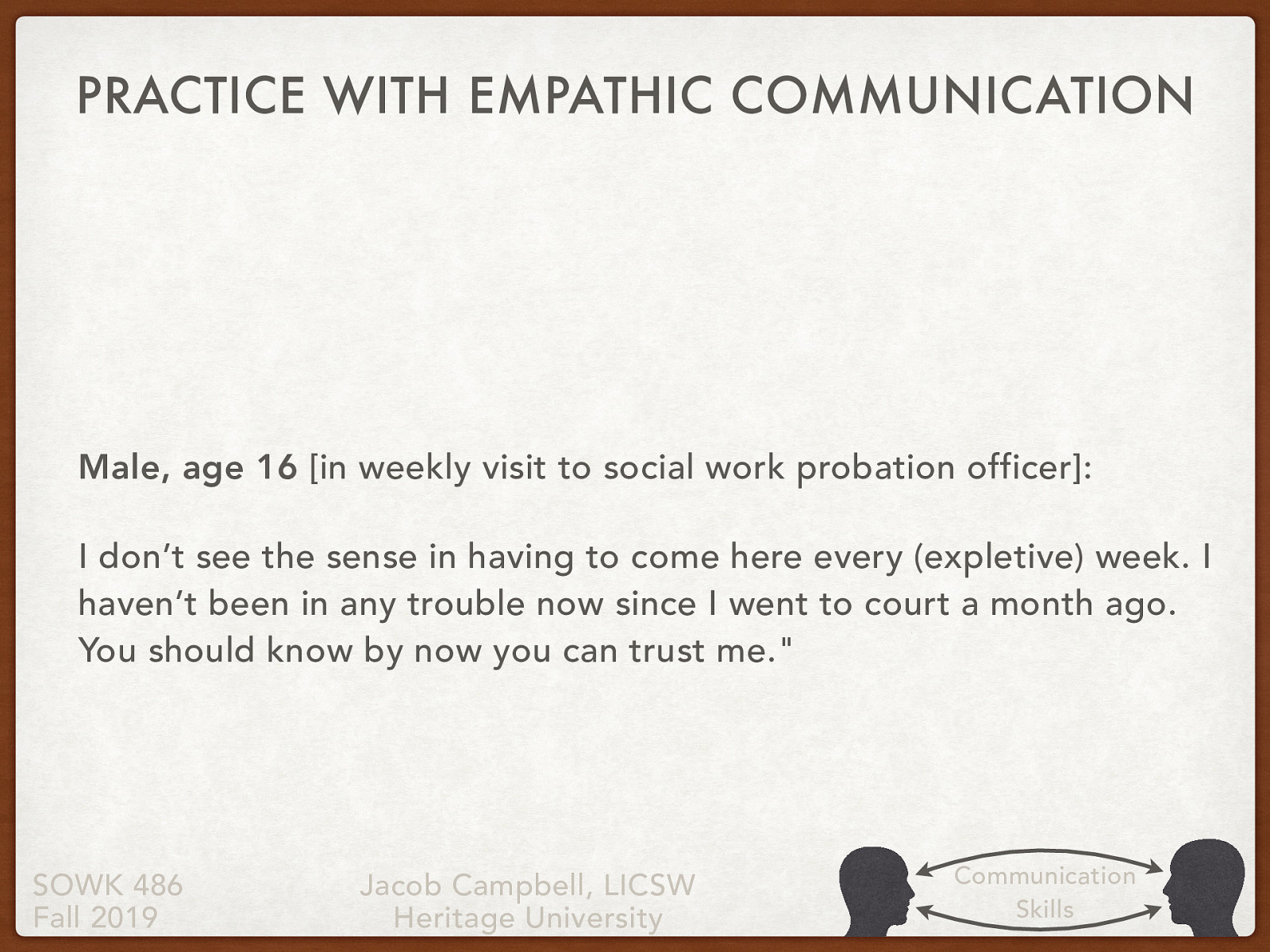
Practice with Empathic Communication (2 of 2)
[Small Group Activity] Work in groups of 4 or 5 to review the statement about this 16 year old male client. Come up with some empathetic responses at each of the levels.
Male, age 16 [in weekly visit to social work probation officer]:
I don’t see the sense in having to come here every (expletive) week. I haven’t been in any trouble now since I went to court a month ago. You should know by now you can trust me.
The focus of this class session on on practicing some of the communication skills that are in the text. The agenda is as follows:
- What’s you’ve learned so far
- Teaching following skills
- Practice with following skills
- Empathetic communication scale
- Practice with labeling empathetic levels
- Teaching empathy
